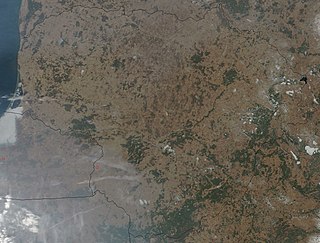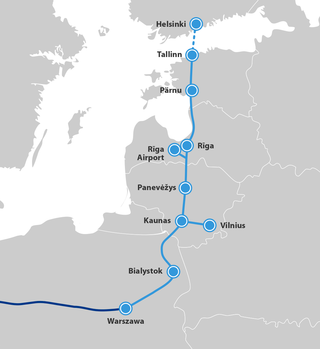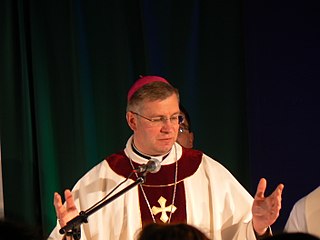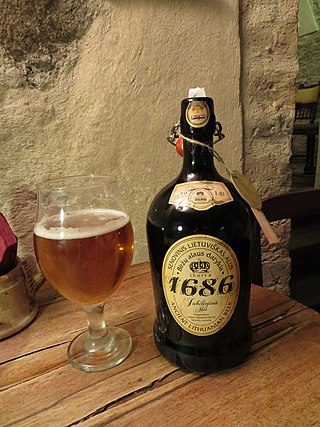
Lithuania is a country in the Baltic region of Europe. The most populous of the Baltic states, Lithuania has 262 km (163 mi) of coastline consisting of the continental coast and the "Curonian Spit" coast. Lithuania's major warm-water port of Klaipėda lies at the narrow mouth of Curonian Lagoon, a shallow lagoon extending south to Kaliningrad and separated from the Baltic sea by Curonian Spit, where Kuršių Nerija National Park was established for its remarkable sand dunes.

Kaunas is the second-largest city in Lithuania after Vilnius, the fourth largest city in the Baltic States and an important centre of Lithuanian economic, academic, and cultural life. Kaunas was the largest city and the centre of a county in the Duchy of Trakai of the Grand Duchy of Lithuania and Trakai Palatinate since 1413. In the Russian Empire, it was the capital of the Kaunas Governorate from 1843 to 1915.

The Singing Revolution was a series of events from 1987 to 1991 that led to the restoration of independence of the three Soviet-occupied Baltic countries of Estonia, Latvia, and Lithuania at the end of the Cold War. The term was coined by an Estonian activist and artist, Heinz Valk, in an article published a week after the 10–11 June 1988 spontaneous mass evening singing demonstrations at the Tallinn Song Festival Grounds.

Music of Lithuania refers to all forms of music associated with Lithuania, which has a long history of the folk, popular and classical musical development. Music was an important part of polytheistic, pre-Christian Lithuania – rituals were accompanied by music instruments and singing, deeds of the heroes and those who didn't return from the war were celebrated in songs.

The Lithuanian Soviet Socialist Republic, also known as Soviet Lithuania or simply Lithuania, was de facto one of the constituent republics of the Soviet Union between 1940–1941 and 1944–1990. After 1946, its territory and borders mirrored those of today's Republic of Lithuania, with the exception of minor adjustments to its border with Belarus.

The river Neris or Vilija rises in northern Belarus. It flows westward, passing through Vilnius and in the south-centre of that country it flows into the Nemunas (Neman), at Kaunas, as its main tributary. Its length is 510 km (320 mi).

The Lithuania national football team represents Lithuania in men's international football, and is controlled by the Lithuanian Football Federation, the governing body for football in Lithuania. They played their first match in 1923. In 1940, Lithuania was occupied by the Soviet Union; the country regained its independence in 1990 and played their first match thereafter against Georgia on 27 May of that year.

The Lithuanian Football Federation is the governing body of football in Lithuania. The Federation is responsible for football development in the country and for the national teams, including the Lithuania national football team. It is based in Vilnius. LFF became a member of FIFA in 1923, but following Lithuania's annexation by the Soviet Union it was disbanded. It became a member again in 1992 after Lithuania regained its independence. The top division is A Lyga.
Kauno futbolo ir beisbolo klubas, commonly known as FBK Kaunas, was a Lithuanian football club from the city of Kaunas.

Russians in the Baltic states is a broadly defined subgroup of the Russian diaspora who self-identify as ethnic Russians, or are citizens of Russia, and live in one of the three independent countries – Estonia, Latvia, and Lithuania. As of 2021, there were nearly 900,000 ethnic Russians in the three countries, having declined from ca 1.7 million in 1989, the year of the last census during the 1944–1991 Soviet occupation of the three Baltic countries.

Rail transport in Lithuania consists of freight shipments and passenger services. The construction of the first railway line in Lithuania began in 1859. As of 2021, the total length of railways in Lithuania was 1,868.8 km (1,161.2 mi). Lietuvos Geležinkeliai, the national state-owned railway company, operates most of the passenger and freight services.

Rail Baltica is an under-construction rail infrastructure project that is intended to integrate the Baltic states in the European rail network. Its purpose is to provide passenger and freight service between participating countries and improve rail connections between Central and Northern Europe, specifically the area southeast of the Baltic Sea. It is also intended as a catalyst for building the economic corridor in Northeastern Europe. The project envisages a continuous rail link from Tallinn (Estonia) to Warsaw (Poland), consisting of links via Riga (Latvia), Kaunas, and Vilnius (Lithuania). Its total length in the Baltic States is 870 kilometres (540 mi), with 213 kilometres (132 mi) in Estonia, 265 kilometres (165 mi) in Latvia, and 392 kilometres (244 mi) in Lithuania. Rail Baltica is one of the priority projects of the European Union (EU). It is part of the North Sea–Baltic Corridor of the Trans-European Transport Networks (TEN-T).

Latvia–Lithuania relations are bilateral international relations between Latvia and Lithuania. Latvia has an embassy in Vilnius, and Lithuania has an embassy in Riga. The two states share 588 kilometres (365 mi) of common border. Both countries are full members of the NATO and European Union.
Aleksas Andriuškevičius is a Lithuanian artist.

Kaunas International Film Festival is a film festival founded in 2007 by Visos mūzos and held in October each year in Kaunas and Vilnius, Lithuania. It has at times visited other cities in the country, such as Panevėžys and Nida. Ilona Jurkonytė is the festival's artistic director and Tomas Tengmark is its programmer.

Giedrius Antanas Kuprevičius is a Lithuanian composer and music educator.

Kęstutis Kėvalas is a Lithuanian prelate of the Catholic Church who has been the Metropolitan Archbishop of Kaunas since 2020. He has been a bishop since 2012, serving first as an auxiliary bishop of Kaunas from 2012 to 2017 and then as bishop of Telšiai from 2017 to 2012.

The beer brewing tradition in Lithuania tends to favor the northern part of the country and is centered around the towns of Pasvalys, Pakruojis, Kupiškis and Biržai. The farmhouse brews of the region are highly distinctive, using local ingredients and techniques from past generations. Lithuanian farmhouse beer has a soft, sweetish malty palate, with hops that do not dominate the flavor profile.

Donaldas Kajokas is a poet, essay writer and editor of the Nemunas literary supplement. He studied at the Kaunas Institute of Physical Education and Lithuanian Physical Culture Institute. He sits on the Lithuanian Writers’ Union on the Council of Kaunas Section.

The European Film Forum Scanorama is a film festival in Lithuania held annually in November. It was established by Gražina Arlickaitė in 2003. Since then she is the manager and artistic director of the festival. The festival was usually held in three cities: Vilnius, Kaunas and Klaipėda, and recently Šiauliai was added to its locations. Originally, it was established as a film forum of Nordic countries. Over time its scope grew and it had eventually become a forum for films from all European countries.


















